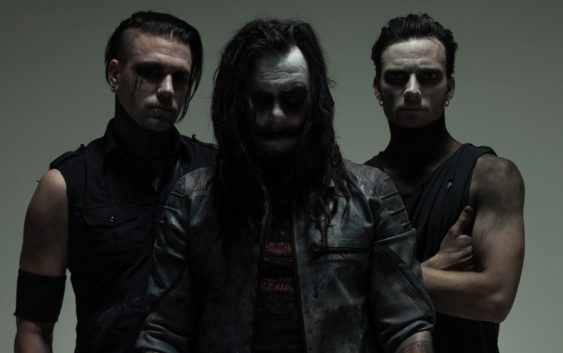Since I first heard The Smell of Rain, shortly after which I saw Mortiis performing live, I have always been intrigued by his music and his image. I knew very little about him at that time, but what I discovered was even more intriguing. Mortiis came out of the black metal band, yet he sounded nothing like that. His first records were dark and ambiental, each consisting of two 20-30 minute long tracks. After The Stargate, Mortiis changed direction and started including industrial music influences into his artistic expression. The project evolved from the original one-man show into a proper band, with Mortiis as the frontman and the only constant member. I had my third opportunity to see Mortiis recently in London, where the band performed together with PIG. It was the last show of their joint “Swine & Punishment” UK tour. With The Great Deceiver behind us and The Great Corrupter remix album announced for 21 April, I thought that it would be the best moment to talk with Mortiis about his career and these two albums. I got my answers during our very wholehearted and incredibly sincere Skype conversation.
1. Mortiis started as a solo project which evolved into a band, with yourself as the only constant member. How do you compare your working process as a solo artist to the one where you are a band member?
 Mortiis: I started out as a solo guy and, obviously, when I was doing that, it was just me. So that was the way of working that I was very used to, very comfortable with, because as a musician or whatever you wanna call me, I’ve never really collaborated much and I don’t know anything about musical theory or any kind of musical language. I have an unorthodox ways of working. For example, when we were making The Smell of Rain, I started working with other people. When I was recording that record, Mortiis was still not a band, it was still a solo project that just enlisted a couple of guys who knew how to play guitar, bass and stuff to be on the record. And what I was doing with them was, for example when I was showing them the guitar riffs, that I would actually sit down and sing all the parts because I don’t play guitar. So for the guitar, like I would hum it out, like these riffs… I would just do it like that and they would have to figure it out. It was all in my head.
Mortiis: I started out as a solo guy and, obviously, when I was doing that, it was just me. So that was the way of working that I was very used to, very comfortable with, because as a musician or whatever you wanna call me, I’ve never really collaborated much and I don’t know anything about musical theory or any kind of musical language. I have an unorthodox ways of working. For example, when we were making The Smell of Rain, I started working with other people. When I was recording that record, Mortiis was still not a band, it was still a solo project that just enlisted a couple of guys who knew how to play guitar, bass and stuff to be on the record. And what I was doing with them was, for example when I was showing them the guitar riffs, that I would actually sit down and sing all the parts because I don’t play guitar. So for the guitar, like I would hum it out, like these riffs… I would just do it like that and they would have to figure it out. It was all in my head.
This seems like a rather complicated way of working.
Mortiis: Yeah, a little bit. At the same time it works perfectly well in my mind. In my universe that’s totally fine. And later on, when Mortiis became a bit more of a band, it was still me making the music, most of the time with Levi. Levi became like a collaborator in 2002 when he joined. What I would do at that point is I would simply program the guitar parts, using synth sounds that sounded a little bit like guitars, like demo tracks. And I would just go like: “OK, listen to this, this is what I want, this is like the meat and potatoes, these are like the basic riffs that I want you to record.” And I would always ask him to do all kinds of improvisations, to do all kinds of crazy experiments on top of it, just to create all these fucked up layers of noise and stuff that we do with Mortiis. But, apart from that, we’ve never written songs together. I have always sat in solitude in my little studio and done all that stuff on my own, just like I did way back when it was a solo project. In many, many ways Mortiis has always been a solo project. When I’m ready to bring other people in, I’ll bring them in and we’ll do that part together. I’m open to a bit of input from other people, in the sense that if they have ideas, I’ll listen to them. But usually I’m a bit of a dictator, I’m not always that easy to deal with. I try. But the end result is quite good, I feel so. I mean, I have worked with Levi in a studio for a long time and he does some really cool stuff. But at the end of the day it’s always sort of based on what I have created. I’ll just go like: “Here’s the foundation, if you want to try to improvise stuff on the top of it.” And that’s one trick that we’ve done many times, I would have one piece of music that’s in progress and I would just loop it or whatever and he’d start doing stuff, trying to improvise stuff on top of it and just record a lot of different things. Most of it will, of course, just suck and be horrible, that’s the way it is when you improvise, but then there will be these few magical little seconds of something really fucking great happening and that would sort of keep those little snippets of awesomeness and I will use that in the music. Almost like a sample thing. And we will find cool uses for it in different places. It’s just a lot about the experimentation.
2. As your career evolved, so has the sound of your project. We can hear dark ambient, electronic, metal, industrial… but whatever you record, it always has something dark inside, even when you come closest to the commercial and poppy. What’s your main inspiration?
Mortiis: Aah, it’s an impossible question. My main inspiration? Ah, I don’t know. I mean, I always just do whatever feels right. I’ve always made music from the heart, if you know what I mean. I’ve never sat down and analysed whatever might be happening right now in the music industry, you know: “Oh yeah, it seems that the power-metal is huge this year, so I’m gonna do that.” I’m not like that, you know. I leave that kind of cynical bullish to artists like Madonna who analyses the market every week to find out what kind of music she should be doing. I don’t do it. I’ll sit down and just start whatever, it might be a sound, a drum sound or a synth sound, whatever I find inspiring. And then whatever happens, happens. And if it sounds cool, I’ll just continue doing it. As far as I am concerned, that’s the most honest possible way of making music, at least to me. I mean, sometimes I might have this idea in my head: “I really want my next album to sound really fucking angry.” But that doesn’t necessarily mean it’s gonna happen that way because if something comes out of the speakers that I made and it’s floaty, really beautiful ambient stuff, I’m not gonna throw it away just because I wanted to make a punk album or something like that. I mean, if great music is happening, then I have to let it happen. So, in terms of what inspires me, it’s kinda hard question to answer. I mean, I have my favourite bands that I go back to a lot, the old classic Nine Inch Nails or Skinny Puppy, Ministry and stuff like that. I’m kind an old school guy like that, I don’t really know what’s going on right now with new bands. I’m sure there’s great new stuff happening, but, honestly, I don’t really have the time to sit there and soak up whatever’s happening right now. In my life there’s just no time for it. I’m always like 20 years behind. So whatever’s happening now I’ll know about it in the year fucking 2037.
3. It’s been a long time since you parted with Emperor. How do you feel about black metal music today?
Mortiis: Ah, I don’t know. I kinda detached from pretty much everything that had to do with music and especially metal and black metal for a long time, but over the last 5 years or so I’ve started to pay a bit more attention to it again, especially with social networking and everything, so you see a lot of these things like flashing by your eyes. It’s a bit weird today in the sense that I was passionate about black metal back in 1991, 92, 93 and maybe 94 and I have been morphing away from it since. But the attitude back in those days was so extreme, sort of dangerous, and the whole idea was that black metal was a very private type of music that not everybody should deserve to listen to it. The thing is that that wasn’t a good attitude, but that was the attitude back in Norway, back in the early 90s, and today the black metal has basically become a household, it’s like everybody’s into it. Put it this way. If a fucking hipster dude had come into the Helvete store in Oslo with Euronymous name and all those guys back in 1992 with his beard and his brand new tattoos, nobody would have been impressed, everybody would have felt like: “Who’s this fucking faggot?!” It’s kinda turning into the absolute opposite. Black metal today is definitely a lot about sales and commercial success and back in the early 90s nobody gave a fuck about that. That was almost the kind of stuff that we did not approve of. Back in those days death metal was huge, it was really popular, it was selling hundreds of thousands of records. And we thought that was kind of example of what the scene had become, that it had become the thing for everyone and we thought that kinda sucked. It’s not necessarily a great attitude, but that is the way it was.
 4. Many artists embrace the alter ego as their stage persona. We know you as the man with the mask and you used that role for a long time on stage, videos and images. Where did the idea come from? Was it hard to let it go or you just felt it was time to explore other visual possibilities?
4. Many artists embrace the alter ego as their stage persona. We know you as the man with the mask and you used that role for a long time on stage, videos and images. Where did the idea come from? Was it hard to let it go or you just felt it was time to explore other visual possibilities?
Mortiis: It wasn’t hard to let it go. The time to let it go was after the mask had served its purpose. Well, to start from the beginning, the reason for the mask way back in the early 90s, was that I was a very huge fan of Tolkien and the fantasy stuff that he and other authors were doing and that I simply adored, I thought that was so awesome. And when I was 4 years old, I discovered Kiss and huge, big image bands, larger than life, big stage shows. These guys were like more than just human. They were like demi-gods to a little kid like me. That impressed me in a huge way. So, when I started my solo project, i.e. when I started Mortiis, that was also in the middle of the days of the black metal and the very extreme attitudes that we had, I just kind of came up with this thing, this image. I was thinking: “What can I do that goes beyond corpse paint and bullet belts, the spikes and the studs?”
Yeah, we’ve seen all of that, bullet belts…
Mortiis: Yeah, all that stuff, I’ve been there, done that 25 years ago. So, I came up with this thing. And I’m sure I was inspired by certain movies that I’d seen, you know, those films where they use prosthetics and I’m thinking: “Fuck, I’ll just take this to the next level and I’ll start altering my whole appearance, not just by simple make up. I’ll change everything.” And that was the way Mortiis happened, you know, the mask. That worked great for a long time, because the concept of Mortiis back in those days was this fantasy inspired parallel universe that later on I would write the whole book about. So, it was the perfect visual and sonical match, until I changed the sound of Mortiis with The Smell of Rain, and then came The Grudge. And when I changed the sound, I also changed a lot, regarding both themes and concepts. It went from being a very fantasy oriented project to something that was very angry and introspective and soul-searching on a personal level. And eventually I just realized and concluded that the mask really doesn’t just serve much of the purpose any more. It’s kind of becoming a relic from the past. So in the end it just felt natural to get rid of it and that’s what I did. But I’ve always been a big fan of image and the visual side of bands, so of course, I was never gonna lose the make up, trying to look interesting on stage and so on, because that’s what my earliest memories are, of the bands like that that do something beyond just music. So, that’s something I’ll never give up, but the mask itself just didn’t really fit later on.
5. I was first introduced to your music at a local CD store. My friend who worked there at the time said “Hey, I have something new, it just came in, you should hear it”. It was your The Smell of Rain album. I bought the CD. At that time I was completely unaware of your previous work. Soon after that I saw you performing live and it was amazing to see you on the stage all dressed up with the mask. I had never assumed that the general public had criticized your appearance as I would found out later. I thought it was quite original and intriguing. But, of course, so many artists adopt the characters to some extent. “It is and it is not you”, that is the explanation one artist gave me. How much can you relate to his words? What do you think about that particular album in retrospect?
Mortiis: It’s not a very easy question to answer. Yeah, he said it right. You’re still yourself on that stage, but you kind of go into this different… it’s like an extension of yourself at the different level and you pour out all these emotions and all this anger, that’s how it is for me anyway, and once the show is over it’s almost like you return to yourself again. I think it’s a state of emotion really. And the visual thing, at the end of the day, that’s just appearance. For me that’s just what I feel that I want to look like when I go on stage, because I don’t want to go up there looking like some guy who just came out the grocery store or something like that. Like I said, I grew up with really visual, image heavy bands. I just love it. I think it belongs in music, the entertainment part, you know. It’s part of the package for me. So, to me, it’s always been obvious that you gotta do something on top of just delivering the melodies, the notes and the voice and the guitar and all that stuff. You wanna do something on top of it. As a fan, that’s what I love to see and as an artist that’s what I love to deliver. Well, of course, when I get on the stage, I get really involved with the show physically and emotionally, so there is all this adrenaline and, to a degree, anger and frustration, all that shit that I write about, I let that really sort of take over for that hour that we’re on the stage. Once it’s over, it’s done I kinda feel like when I go on stage I’m so pumped up on adrenaline that I feel like I’m going like into a boxing match or something like that, because I’m always nervous. I mean, I’m nervous and relaxed at the same time, I’m in a very strange place 5 minutes before our show starts, because I’m quite experienced with it, I’ve done a lot of shows, you know, so I’m not scared, but there’s a lot of adrenaline which makes you seem uneasy. A lot of energy that needs to come out. And, of course, that’s not my normal state of mind, that’s just the thing that happens when I’m on stage.
 I’m interested in the psychological aspect here, when a person adopts another character to be someone else on stage. Where’s the line? Because I read stories about Bowie who had a lot of alter egos or personas and at one point in his career he kind of got lost in all those characters that he played. Can you get lost in all that, in your own identity? Can that happen?
I’m interested in the psychological aspect here, when a person adopts another character to be someone else on stage. Where’s the line? Because I read stories about Bowie who had a lot of alter egos or personas and at one point in his career he kind of got lost in all those characters that he played. Can you get lost in all that, in your own identity? Can that happen?
Mortiis: I think it probably can. I’m sure I’m lost, I just haven’t really realised it. There was something that my wife told me about it, she said: “You’re not a fucking band member, you are the music, you can never get away from this, no matter how hard you try.” I have never thought about it in that manner previously. I mean, I’ve been this Mortiis guy for all intents and purposes, I’ve pretty much been a solo guy with people around me for 20 years. It’s always been Mortiis, Mortiis, Mortiis, and I am fucking Mortiis. It doesn’t matter what I try to do for the rest of my life, that thing is like in my DNA now, it’s like I can’t get away from it. I don’t think there’s any way I can mentally… if I wanted to quit music, I couldn’t just walk away and expect that it will be over tomorrow and I’m sure a lot of guys who take on these sort of artist’s names and then live and breathe their art for so long would say the same thing. I wouldn’t be able to do it… If someone asked me when did Havard end and when did Mortiis take over, I wouldn’t know. Has that happened? Or did it happen and I didn’t notice? I just morphed into this fucking artist guy who would now have to remain like this forever. So I don’t know if it’s so much a stage act any more as just me elevating it to a slightly different level when I’m on stage, but in the end it’s still me.
I later found out that you had been criticized for your appearance. I had never assumed that previously.
Mortiis: Oh yeah, yeah, I’ve taken countless amounts, just absolutely ridiculous amounts of shit for the image. The British press was usually the worst, because they, of course, loved their little headlines, they loved to pick on people just so that their stories can sound more interesting. But it’s not that bad these days really. But it was different back when I signed with Earache records, back in those fucking horrible days of that abuse in 1999 when the record The Stargate came out, which was my first album for the Earache records. Before that record came out, Mortiis was very very underground and the biggest kind of magazine coverage I could ever hope for would be that maybe a magazine like Terrorizer, or something similar in the UK, would write a little bit about it. All of a sudden, I’m talking to Metal Hammer, I’m talking to Kerrang mag and the fucking NME magazine, which was really big back then, and I’m not gonna slag these mags off, because they eventually became quite supportive of Mortiis. But in the beginning, a lot of the British press especially, really gave me a hard time and gave me some really horrible reviews too. It was like a troll clown, they always kept like: “Oh the Norwegian troll strikes again with the stupid ass bat wings and whatever…” So laughable. But the really frustrating thing back in those days was that at that time you had certain other bands with at least as extreme image with 9 members in their fucking line up with masks who never got any fucking shit. And I’ll tell you why. Because they probably made those magazines so much advertising money and made those magazines sell so much more that there’s no way they’re gonna fucking slag it off, because it’s politics and money. I’m not an idiot, I know what’s going on. But you take some fucking dude from Norway who signed up for a record label that never spends a dime on anything, they can pick on him. And that’s what kinda pissed me off, the fucking hypocrisy of the media. But, you know, it’s a long time ago and then The Smell of Rain came out and all of a sudden I was getting really popular.
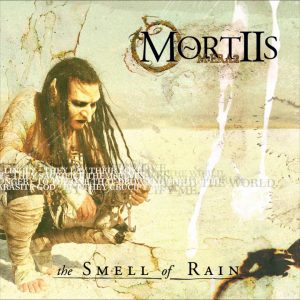 Yes, that is what I was asking about. What do you think about that album today, in retrospect?
Yes, that is what I was asking about. What do you think about that album today, in retrospect?
Mortiis: I love it. It’s a really good album. I think that what happened there was that I took some of the elements of the old Mortiis, which were like a really sort of pompous epic type of stuff with the choruses and the big strings, and I sort of mashed them together with all these new things that I wanted to do, which was more a sort of programmed electronics with distorted guitars and the lead vocals that I really wanted to do because at the end of the day I grew up with really great frontmen… Iggy Pop and Alice Cooper and all those guys. And at the end of the day, that’s what I wanted to do. So, I finally started doing that with Mortiis. On The Smell of Rain I just combined my past with my future and a lot of people liked it, that was just cool. To be honest, that album never sounded as angry and heavy as I actually wanted it to be. It came out sounding like gothic to me, gothic, sort of electronic, but it has a lot of great melodies, a lot of good songs. I mean, of course, looking back, there’s a tonne of stuff I would have done differently if I did it today, but I’m very proud of it because it changed my life. It’s a ladies album, a lot of girls seem to like it. It’s got melodies and stuff, it’s not super angry.
6. Can you compare the writing and recording process of the Era I albums to the later releases? What has changed regarding the inspiration and in the technical sense?
Mortiis: The old stuff was literally just me, one keyboard and a notepad, and that was it. The way I wrote music back in those days was really fucked up and also mind fucking in a way. I can’t believe how I was doing it. I had one keyboard and there was no sequencers or any way to record demos or record pieces of music so I would remember them for the studio. It was me and a notepad and a few different coloured pens. And what I’d do was I would work on one piece of music using one sound for however long that piece of music would be. If that was a four-minute piece, I would just kind of rehearse it and in my mind try to come up with other melodies that I could put on top of it and then I would separately rehearse those pieces of melody… this is very hard to explain… and then, for each piece of music that I wrote per sound, you know piano, oboe, English horn, timpani, all this sort of ethnic types almost of sounds I used back in those days, I would write down each and every sound on that notepad in its own coloured pen, I would colour code everything so I wouldn’t forget. And I would piece everything together into these 20-25 minutes long songs that I did back in the early days. So, I can’t believe the way I did it, it was insane, very primitive. The easiest way to explain it was that those entire records were basically created in my mind and I never knew what any of them would sound like until I finally got into the studio and recorded one sound on top of the other, like what you do with music. Regular bands would record guitars, bass, drums, vocals. I wasn’t able to practice or anything with anybody else. For the three first records I basically created those… a lot of that process was happening in my mind and I wasn’t really able to listen to or know what my records would sound like until I actually got into the studio to recorded them.
But, regarding inspiration, you also changed direction at one point, with The Smell of Rain.
Mortiis: Yeah, yeah, that was after The Stargate. I was overcomed by this really terrible depression and delusion… I’d lost all faith in myself, in my ability to create music and I thought that everything that I had done was really awful. It got really bad for me, I hated my 90s stuff for at least 15 years. By that point I’ve also gotten into a lot of that sort of the crossover industrial-metal stuff that I thought was awesome. I have always been a fan of the synth music ever since the very early 90s, you know, when I started to listen to Kraftwerk, Tangerine Dream, Klaus Schulze and Vangelis and lot of these sort of 70s pioneers. Then I discovered bands like Ministry, Skinny Puppy, KMFDM, Nine Inch Nails and bunch of others that were actually using a lot of these sort of heavy metal elements that I had grown up with plus tones of really interestingly manipulated keyboards. So there I was, thinking: “Fuck, this is awesome. This is what I have to do, this feels really inspiring, this is motivating as fuck, this is what I gotta do, I really want to do stuff like this.” And they had frontman guy singing the lead vocals which is what I really wanted to do too. I really felt that that was something that I would be able to be good at, being a frontman. So, that’s how it started. It started with the fucking depression and self-loathing.
You know, it’s really hard for me to imagine you depressed, sorry.
Mortiis: I know, but I’m a really good actor. I’m just kidding. But, I mean, here’s the thing when it comes down to being depressed. It comes and goes, just like what I’ve been dealing with, this more manic depression stuff, it’s not here constantly. It comes and goes. But the best weapon against it is this answer that I give whenever someone asks me: “How did you deal with it?” : “Comedy and humour.” The more you can laugh at anything, it doesn’t matter what you laugh at, as long as you can laugh, that’ll generate a sort of good vibe and that’s a really good remedy. It will keep that fucking shit away for a few more moments, so that’s what I’ve always done. That’s why I keep joking around and fucking around all the time, it keeps the demons away. It’s a weapon.
 7. Considering your wide opus, I assume that the inspiration for your music was very diverse. What kind of music do you enjoy the most? Are there other aspects of art that you enjoy as much?
7. Considering your wide opus, I assume that the inspiration for your music was very diverse. What kind of music do you enjoy the most? Are there other aspects of art that you enjoy as much?
Mortiis: I used to be really into reading books, but these days I just don’t have time. Of course, you know, writing is as much as an art form as anything. My interests have just been very varied over the years, but in these days, to be honest with you, I’m really kind of very interested into the old British hard rock music which is what they call the new wave of British heavy metal. It is such an interesting, old and dead scene now, it was more active in the late 70s and early 80s with a lot of bands putting out nothing more than one or two 7” s, sometimes even an album, before splitting up. The better known bands of that genre would be Witchfinder General, Angel Witch, Demon… the big bands that came out of it were Iron Maiden and Saxon, maybe Judas Priest. I’m just really into hard rock music these days, early 80s stuff. That’s what I really enjoy listening to, really quite far away from the kind of stuff that I do. But that’s what I like to listen to right now. That’s the kind of stuff that I grew up with, hard rock and heavy metal, but at the end of the day it is the kind of musical style that… you know, if I listen to too much of the type of music that I make, I start comparing and I start thinking: “Oh, these guys are better than me.” And it just gets me depressed. Although maybe that even isn’t true, they maybe aren’t better than me, but, like I said, I have had that horrible self-doubt and analysed myself too much, so I have just chosen to listen to music that just makes me feel good, that is easy, simple, no bullshit, and that’s why hard rock and heavy metal is so great, because most of the time there’s no pretence in it. It’s just a sort of feel good, fucking rock out type of thing, it’s just easy and simple.
8. You also made a soundtrack. Can you tell us a little bit about that aspect of your work? How much does it differ from writing a music album? Would you engage in writing a film soundtrack again if something good came along?
Mortiis: Yeah, if something great came along. I did it once and it was a long time ago. But that was more a question of just me sitting down. I didn’t have the movie in front of me and the director guy just sort of told me what aspects of my music he liked, like the darker, more ambienty stuff, and I just figured: “OK, fuck it, I’ll just make some more of that.” And that’s how pretty much that came along.
So you did it almost blindly, you didn’t know what the movie was about?
Mortiis: No, I just sat down and made dark music. But, I knew the guy. I knew that what he was making has to be really dark, that it was gonna be a movie about crazy horrible things happening in a forest or something, so I just went ahead and made dark sounding fucking music. To be honest, I don’t think it was done in any kind of professional way. It was just me sitting down and hoping for the best. He liked it so he used some of it. So that was cool.
So how much that experience differs from writing an album?
Mortiis: To be honest, at that time it didn’t differ at all. I just sat down, did exactly the same as I always do. But, I mean, looking back at it, I honestly don’t think that what I did was really writing a soundtrack. What I did was writing songs, you know. I think that when you write a soundtrack, you have to put a lot of effort into not stealing too much of the attention away from the movie. And what I always do with my music is I put on a hundred sounds at the same time, like all kinds of fucking stuff happening, and that is not necessarily ideal for a soundtrack. And in a movie the music is there only to sort of emphasize the movie, you know, enhance the overall experience of the movie, not to steal all the attention which is what I think my music might have tried to do. Not intentionally. But looking back at it, I should have probably been more thoughtful about what I was doing. But, I mean, then again, I didn’t have any visual aid, I didn’t have any movie in front of me, so I didn’t quite know what I was doing. But he was happy. I’ve heard about other people doing it that way. Maybe you get a short description or maybe they’ll throw you a few examples of other music pieces, like: “This piece of music is really awesome, that’s exactly the kind of spirit that I want, can you make something like that?” I’m sure there’s a thousand ways to do it, but, like I said, I’m really happy with the music that I made, I still think it’s great. But whether or not I would have been more considerate towards the actual movie if I had done it today, whether I would have not just totally focused on the music…. You gotta think about the actual movie too.
9. I’ve recently listened to one of your interviews. You said that you had taken a lot of criticism from both metal and industrial-electronic crowd. Considering that your music appeals to fans of both genres, how is that possible? What do you think was the reason you got picked on a lot? Personally, I never got that impression.
 Mortiis: To start with, that used to happen more in the past, I think. Either that or I have simply stopped paying attention, which is also true. But, you know, people in the industrial scene can often be a bit narrow minded. Maybe that was a thing of the past, something that was more often happening back in the Cold Meat Industry days when I was signed to that label in the mid 90s and there were a lot of these elitist old-time industrial types around and those guys don’t really have images or the visual. I think that they don’t really care about visual that much a lot of times, they’ll put on their little Gestapo boots and their Mussolini pants and that’s about it. And then there came along someone like me, someone quite fresh back in 93, 94 when I started putting out records with Cold Meat… I had this feeling that I was not necessarily welcome 100% by some people, I think. Maybe they felt threatened, I don’t know. Because Mortiis sold more records than those guys and I’m sure they didn’t like that. Metal guys probably had an issue with Mortiis, because Mortiis was synth, Mortiis was synth based. And again, I was rubbing shoulders with them because I came out of the metal environment, I came out of the black metal band and I think it might have freaked them out a little bit for Mortiis to become this completely and totally keyboard based project back then. There are some little guys who for some reason find keyboards to be a little bit gay, which I always though was ironic, because, can you imagine, you got a heavy metal guy, he thinks he’s hard as fuck, he’s wearing his old Dio t-shirt or whatever The Last In Line or Holy Diver, awesome fucking records, but those guys, old heavy metal bands, they usually had 5 members, didn’t they, and the 5th member played what? 15 fucking keyboards. Take a look at any fucking old hard rock band from the 70s, like Deep Purple or Rainbow or something like that, there was a keyboard player. That’s so ironic. But, well, that’s just my theory. But you know, it all goes down, a lot of people react with negativity to something that they don’t quite understand. So, if it’s unknown and weird and they don’t know how to relate to it then, some people’ll just start saying a lot of shit, I don’t know if they get fucking scared or freaked out. I don’t really know. I mean, these days the trick is just to fucking ignore it. The one thing I haven’t done in like 15 years is search for myself on Google and see what people say, I don’t want to piss myself off. Of course, I used to do it when the Internet became the thing in the late 90s, when I got hooked up online. Of course, the first thing you do is google yourself. Back in those days, of course, there was no Google, there were Altavista and Yahoo and whatever, the search engines, you know what I mean. I stopped doing it really quickly because every time I did it I got pissed off, there was someone who was saying something fucking bad about me. Someone I had never met was saying something bad about me. I mean: “What the fuck, you don’t even know me and you fucking have this big opinion. Yeah, fuck you, you know.”
Mortiis: To start with, that used to happen more in the past, I think. Either that or I have simply stopped paying attention, which is also true. But, you know, people in the industrial scene can often be a bit narrow minded. Maybe that was a thing of the past, something that was more often happening back in the Cold Meat Industry days when I was signed to that label in the mid 90s and there were a lot of these elitist old-time industrial types around and those guys don’t really have images or the visual. I think that they don’t really care about visual that much a lot of times, they’ll put on their little Gestapo boots and their Mussolini pants and that’s about it. And then there came along someone like me, someone quite fresh back in 93, 94 when I started putting out records with Cold Meat… I had this feeling that I was not necessarily welcome 100% by some people, I think. Maybe they felt threatened, I don’t know. Because Mortiis sold more records than those guys and I’m sure they didn’t like that. Metal guys probably had an issue with Mortiis, because Mortiis was synth, Mortiis was synth based. And again, I was rubbing shoulders with them because I came out of the metal environment, I came out of the black metal band and I think it might have freaked them out a little bit for Mortiis to become this completely and totally keyboard based project back then. There are some little guys who for some reason find keyboards to be a little bit gay, which I always though was ironic, because, can you imagine, you got a heavy metal guy, he thinks he’s hard as fuck, he’s wearing his old Dio t-shirt or whatever The Last In Line or Holy Diver, awesome fucking records, but those guys, old heavy metal bands, they usually had 5 members, didn’t they, and the 5th member played what? 15 fucking keyboards. Take a look at any fucking old hard rock band from the 70s, like Deep Purple or Rainbow or something like that, there was a keyboard player. That’s so ironic. But, well, that’s just my theory. But you know, it all goes down, a lot of people react with negativity to something that they don’t quite understand. So, if it’s unknown and weird and they don’t know how to relate to it then, some people’ll just start saying a lot of shit, I don’t know if they get fucking scared or freaked out. I don’t really know. I mean, these days the trick is just to fucking ignore it. The one thing I haven’t done in like 15 years is search for myself on Google and see what people say, I don’t want to piss myself off. Of course, I used to do it when the Internet became the thing in the late 90s, when I got hooked up online. Of course, the first thing you do is google yourself. Back in those days, of course, there was no Google, there were Altavista and Yahoo and whatever, the search engines, you know what I mean. I stopped doing it really quickly because every time I did it I got pissed off, there was someone who was saying something fucking bad about me. Someone I had never met was saying something bad about me. I mean: “What the fuck, you don’t even know me and you fucking have this big opinion. Yeah, fuck you, you know.”
But once you put something out there as an artist, anyone can pick on you or say whatever.
Mortiis: Yeah, I know that. I think that if they had limited themselves and gone with “I don’t like his music, and I think his pictures are dumb”, I would have been: “Ok, that’s fine.” But it was almost like they hated me on a personal level. And when it’s obviously just based on some sort of personal kind of hatred…
10. Music business is not all about making music. There is a lot of “background” work of which the fans are not even aware. You have experience of running your own record label. What are the pros and cons of releasing your music that way?
Mortiis: The quick answer to the pros and the cons. The pros of course mean that you keep all your rights, you own all your own stuff, which means no-one else can fuck around and do whatever they want with your music and whatever that might be and you’re free to take your music to anyone in the future if all of a sudden you have the opportunity to use your music in movies or whatever, or if you want to sign with the record label that seems like a good deal, you can do that, because you held to all your rights. So there’s the flexibility. The cons obviously being that you have to pay for everything yourself, no-one else is 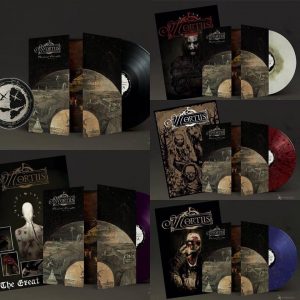 gonna help you, and if you get a distribution deal, if you’re unlucky all of a sudden they’ve taken a huge pile of stock and they’ll fucking disappear and never pay you. Stuff like that can happen. Everything is on your shoulders, you have to do all the advertising, set it up, create all the artwork, everything has to be done by you, you have to pay for all of that, the whole big fucking party, that bill is gonna be on you, that’s gonna have your name on it. So, that’s a pretty big responsibility. If you don’t have the financial means to be professional as the record label up to a certain degree, I’m not sure if it’s worth it. Also, you have to have a lot of time, you have to have a lot of patience, you have to deal with a lot of people. And then, after all of that, the chances are that your band – if you’re a band like Mortiis which is quite underground, I mean, Mortiis is to some degree known to a certain type of people, but even then – can’t expect huge sales, especially not in 2017. I mean, if I had done what I am doing now in 1997, I would have sold 10 times more records. Because I was doing it in 90s and it was a lot easier to sell records back then. Different times, you know. So, are you gonna make your money back, is your investment going to pay off? It’s a gamble. And all that fucking time that it takes. But the point is, you’re probably gonna have to have a normal day job on top of everything else. So, you’re gonna be one busy motherfucker who is constantly frustrated and stressed out when you do this on your own and that’s exactly where I’m at. I mean, I am used to it. I’m very hands on, I’ve always been very hands on even when I was signed with Earache or Cold Meat or Malicious Records or anyone else, I was always very much a part of what was going on, so I’m kind of used to it, I’ve sort of gotten rough round the edges now, you know what I mean, thick skin and all that. I have a pretty good idea what you can expect when you put out a record yourself, but it’s fucking hard work, you know. But, like I said, at least you keep your own rights and maybe one day, if you’re lucky, there is a record label that comes along and actually offers you a fair deal that isn’t gonna be like spending the next ten years in hell. It’s like winning a lottery now. I’m not saying it’s gonna happen, I’m saying if you’re lucky.
gonna help you, and if you get a distribution deal, if you’re unlucky all of a sudden they’ve taken a huge pile of stock and they’ll fucking disappear and never pay you. Stuff like that can happen. Everything is on your shoulders, you have to do all the advertising, set it up, create all the artwork, everything has to be done by you, you have to pay for all of that, the whole big fucking party, that bill is gonna be on you, that’s gonna have your name on it. So, that’s a pretty big responsibility. If you don’t have the financial means to be professional as the record label up to a certain degree, I’m not sure if it’s worth it. Also, you have to have a lot of time, you have to have a lot of patience, you have to deal with a lot of people. And then, after all of that, the chances are that your band – if you’re a band like Mortiis which is quite underground, I mean, Mortiis is to some degree known to a certain type of people, but even then – can’t expect huge sales, especially not in 2017. I mean, if I had done what I am doing now in 1997, I would have sold 10 times more records. Because I was doing it in 90s and it was a lot easier to sell records back then. Different times, you know. So, are you gonna make your money back, is your investment going to pay off? It’s a gamble. And all that fucking time that it takes. But the point is, you’re probably gonna have to have a normal day job on top of everything else. So, you’re gonna be one busy motherfucker who is constantly frustrated and stressed out when you do this on your own and that’s exactly where I’m at. I mean, I am used to it. I’m very hands on, I’ve always been very hands on even when I was signed with Earache or Cold Meat or Malicious Records or anyone else, I was always very much a part of what was going on, so I’m kind of used to it, I’ve sort of gotten rough round the edges now, you know what I mean, thick skin and all that. I have a pretty good idea what you can expect when you put out a record yourself, but it’s fucking hard work, you know. But, like I said, at least you keep your own rights and maybe one day, if you’re lucky, there is a record label that comes along and actually offers you a fair deal that isn’t gonna be like spending the next ten years in hell. It’s like winning a lottery now. I’m not saying it’s gonna happen, I’m saying if you’re lucky.
I talk to a lot of musicians and everyone has pretty much the same story.
Mortiis: I know, because it’s the same for most bands. I think doing it yourself is great but you have to be prepared. And I don’t want to shine a super negative light on it. What I’m trying to say is that you have to be prepared to work hard and have to be prepared to be really… It’s a steep learning curve with all these different things that you have to think about when you’re supposed to try to run your own label. And it’s going to be expensive, but, I mean, hopefully in time you will get some records out, maybe you will have a little bit of success, in time, it might pay off. I think if you don’t have a very special kind of passion for this kind of artistry, it’s too hard for people. I mean, I have huge passion for what I do. So, for me it’s more like a drive, I have to do this or otherwise I’ll fucking die. What else I’m gonna do in life? Go to work and go back? I’d fucking kill myself. So, I have a mission in life. I think it’s the artist gene. Sometimes it kind of goes away and disappears for a few years, which is what I did when I was getting my life in order, when I was getting myself a proper job, when I was getting my financial situation more stable, then I came back and put out The Great Deceiver, and now I’m back working quite hard on all these things and hopefully I’ll stay around for a while. But that being said, my main interest in my life is my family, of course. And if that means I have to focus even more on work and less on music I’ll make that sacrifice.
11. I believe it’s vital for artists to be connected with their fans and get the news out there in the shortest time possible. How helpful do you find social media in that sense?
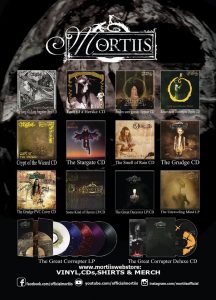 Mortiis: It’s really the only and the best tool for getting it out. If you want the news out instantly, you go to your Facebook pages, right?! And then, of course, you complement it with your Twitter and your Instagram, wherever you have the most followers. For us, it’s still Facebook, Instagram is kind of growing. Twitter is fucking slow. That’s more for movie stars, I guess. Yeah, I completely agree. What other way is there? We have our email lists, of course, but I kinda suspect less and less people check email. Email’s like the old mass thing now, the new snail mail, because people may not see the news on their email for hours. Back in the old days when I printed the record out… for instance, in 1995 if you put your record out in April, people would know about it in June. It was ridiculous. Unless, of course, you were signed to a bigger label and they were doing it properly. They would print fliers in January about the album being out in April and so on, you know. So, it worked back then too. Everything worked, but it took so much longer.
Mortiis: It’s really the only and the best tool for getting it out. If you want the news out instantly, you go to your Facebook pages, right?! And then, of course, you complement it with your Twitter and your Instagram, wherever you have the most followers. For us, it’s still Facebook, Instagram is kind of growing. Twitter is fucking slow. That’s more for movie stars, I guess. Yeah, I completely agree. What other way is there? We have our email lists, of course, but I kinda suspect less and less people check email. Email’s like the old mass thing now, the new snail mail, because people may not see the news on their email for hours. Back in the old days when I printed the record out… for instance, in 1995 if you put your record out in April, people would know about it in June. It was ridiculous. Unless, of course, you were signed to a bigger label and they were doing it properly. They would print fliers in January about the album being out in April and so on, you know. So, it worked back then too. Everything worked, but it took so much longer.
Did you notice that Facebook is messing all of us content providers?
Mortiis: Oh totally. They’re making us pay for everything now. A few years ago Facebook served us probably the biggest lie that has ever been told on the Internet which was that Facebook had this slogan, I don’t know if you remember. It said: “Facebook is free and always will be.” And there was like a big headline when you signed up to Facebook. It said: “Facebook is free and always will be.”
You should have taken a screenshot of that.
Mortiis: I know. But who knew what a bunch of fucking vampires they would become. They’re evil. They’re fucking Satanic. If you want anything to be visible to more than a few hundred people now, you have to pay ’em. I pay sometimes if I literally want to put an advertisement out there, if I’m selling something like this remix record, I think I’ve boosted one or two posts for pre-orders, but that’s like paying for advertising and I’m thinking that’s ok. The mentality is a bit different then. But if I have a cool live photo, something that I really like, I’m not gonna fucking pay them 50 Euros just for more people to see it. But it’s annoying though, because you can’t reach out to all these people that you worked so hard to collect on your socials. You work for weeks, months, years. When you compare Instagram with Facebook, most people probably have a lot less followers on Instagram than on Facebook because Instagram is much younger, but if you post a photo there you almost instantly get much more attention and likes than you do on Facebook. I think it proves how badly Facebook is now choking your followers. It’s as if their whole thing is that they’re basically holding 95% of your followers and they’re been held at ransom. We’ll show your posts to all the people you worked hard to get to follow you if you pay us money. It’s a hostage situation. Facebook is basically a terrorist. Facebook ass-fucked everyone and Facebook is now getting very rich off of bands and small businesses, I think, who are more or less dependent on it, because all our people are out there. For small businesses the entire range of customers is there, but Facebook will not allow them to talk to their customers unless they pay them money. It shouldn’t even be legal.
My question “How helpful do you find social media?” all of a sudden got a whole new dimension.
Mortiis: Well, it’s helpful, because it’s instantaneous and it’s fast and you can still get results. But based upon the direction that things are going in I’m sure Instagram in couple of years will be just like Facebook. And they’ll fucking do something fucked up to us as well. I know that when I do boosted posts on Facebook I can also choose run that ad on Instagram, probably because Facebook owns Instagram, unless I’m mistaken. But what I’ve done in the past year or so, as an additional promotional activity, is that I’ve actually gone back to what I used to do a lot in the 90s which was simply to print up a fuck load of fliers. And I use street teamers. I send the fliers out to the street teamers and they’ll pass them out at shows, put them into stores and I do a lot of split fliers with other record labels, mail orders, other bands, each of us take one page on one side of the flier and we spread them around. It’s a very street/underground way of spreading a word. But that’s exactly how I started out. I’m going back to basics. The fliers never went out of fashion in that sense. And there’s no-one out there that can force me to pay them money to allow the people to see these fliers. Except for the print of course. Printing fliers these days is so cheap, you can print 5000 fliers for like less than a hundred Euros. It’s not like the old days. If you wanted to print like 5000 or 10000 fliers you had to pay fucking 300 Euros or more. That was expensive back in those days. But these days it’s quite cheap.
12. What inspires you for your visuals? How pleased are you with the videos that you made? Do you consider videos to be a significant part of the project or merely a necessary promotional tool?
Mortiis: I think that, provided that you can make videos because making them is not exactly without expenses, if you can make them, they are a great extension to your art, to the music. It’s the whole product, it’s just another layer that you can add to your release. Are they necessary today in this world where we even don’t have any real TV music stations for videos left? I mean, MTV hasn’t played anything but bullshit in last 15 years. And for stuff that isn’t backed by massive multimillion dollar labels what kind of music TV is still out there? Of course, there’s Youtube and VIMEO and Facebook has a video thing, Bandcamp, you know, people can download it or whatever, so, I think, if you can do it, if you can make a video, I think it’ll be beneficial for you. But if you cannot, then I don’t think it’s gonna make a huge difference in your career. I think the answer would probably be different if you’re a big artist, if you’re Beyonce or some fucking massive huge name. I think that then you have to have a video because, of course, everybody would play that video. Then you have to have it. But for someone like me, I think it’s just a bonus if you can make it.
How pleased are you with the videos that you have produced so far?
 Mortiis: I’m very pleased. Let’s start with “The Demons are Back” video. We didn’t pay a lot for production, a thousand Euros tops probably, and it shouldn’t have even been that. I don’t know if you have seen it, but at the very end of that video there’s a scene with a lot of blood sort of gushing out of the mask thing. I was sitting in this sort of TV studio where we’re filming it and there’s a really kind of expensive white floor underneath; we covered the floor with a lot of plastic bags and taped them to avoid any mess, but a lot of that blood somehow went straight to the floor and apparently the TV company that owns the studio had to call in cleaners or something like that and we had to pay the bill. So, most of the video budget was actually the bill for the cleaning crew. The other videos I made, like “Doppelganger” or “The Shining Lamp of God”, were made quite a long time ago and I got a really good deal on those too. But that was back in the days when I was making fucking crazy sacrifices for the sake of my music and I sold a huge chunk of my record collection which was a lot of really valuable stuff and I think I paid something like 20000 dollars. A lot, a lot of money, a tonne of money. I had a lot of records – I still have a lot of them – and I made a lot of money out of them and invested that money into these videos, but not only into their production. The videos were recorded in Los Angeles so I flew there with the band and we spent a week over there. While we were in LA, I was financing a lot of stuff with that money and got the videos and some studio time. We were working with Chris Vrenna for a few songs as well. Everything that we did cost us a lot of money. But, I mean, I’m happy I did it, because those videos are fucking awesome. And I bought all those records back later anyway, so I have them back in my collection. But yeah, those videos pretty much defined the atmosphere and the visual vibe of The Great Deceiver, just the fucking violence and anger, I believe everything was kind of embodied within those two videos. So, to me personally at least those videos are the absolute victory. I mean, we were finally able to make these fantastic videos that I’m extremely proud of and happy with. So, at this personal level, that goes way beyond any kind of money. I’m totally stoked about them.
Mortiis: I’m very pleased. Let’s start with “The Demons are Back” video. We didn’t pay a lot for production, a thousand Euros tops probably, and it shouldn’t have even been that. I don’t know if you have seen it, but at the very end of that video there’s a scene with a lot of blood sort of gushing out of the mask thing. I was sitting in this sort of TV studio where we’re filming it and there’s a really kind of expensive white floor underneath; we covered the floor with a lot of plastic bags and taped them to avoid any mess, but a lot of that blood somehow went straight to the floor and apparently the TV company that owns the studio had to call in cleaners or something like that and we had to pay the bill. So, most of the video budget was actually the bill for the cleaning crew. The other videos I made, like “Doppelganger” or “The Shining Lamp of God”, were made quite a long time ago and I got a really good deal on those too. But that was back in the days when I was making fucking crazy sacrifices for the sake of my music and I sold a huge chunk of my record collection which was a lot of really valuable stuff and I think I paid something like 20000 dollars. A lot, a lot of money, a tonne of money. I had a lot of records – I still have a lot of them – and I made a lot of money out of them and invested that money into these videos, but not only into their production. The videos were recorded in Los Angeles so I flew there with the band and we spent a week over there. While we were in LA, I was financing a lot of stuff with that money and got the videos and some studio time. We were working with Chris Vrenna for a few songs as well. Everything that we did cost us a lot of money. But, I mean, I’m happy I did it, because those videos are fucking awesome. And I bought all those records back later anyway, so I have them back in my collection. But yeah, those videos pretty much defined the atmosphere and the visual vibe of The Great Deceiver, just the fucking violence and anger, I believe everything was kind of embodied within those two videos. So, to me personally at least those videos are the absolute victory. I mean, we were finally able to make these fantastic videos that I’m extremely proud of and happy with. So, at this personal level, that goes way beyond any kind of money. I’m totally stoked about them.
13. A year ago you released The Great Deceiver after a long pause. What took you so long?
Mortiis: There’s a lot of reasons, really. First of all, the creative part took a lot longer than I anticipated. First of all, I was never happy with… first time around, we recorded guitars, we recorded vocals, then we were not happy with that, we went back in and redid everything. Then I found out that I wanted to re-program a lot of the songs, a lot of the keyboards, a lot of the samples and all that stuff. That took a long time. Then we were starting recording it and planned to have Chris Vrenna, the old Nine Inch Nails guy, mix it, but we had to stop after the five songs because he got called for a huge project, some big fucking money making thing, and he could not afford to say no, so we had to stop, which is understandable, because we came in there with a bullshit budget and he was being a cool guy, my friend, you know. When he received the big offer, he had to do it and that’s understandable. Then we made the decision to start over again in the studio in my hometown. Levi and I mixed it, we spent at least two months just mixing this album because there were so many sounds that are so difficult to mix and make everything fit in sonically in this sort of sonic spectre. So, that was finally done. Then it took a long time to master. Everything just took so long with this record. When that was finally ready, I just put it on the table and told my manager: “OK, man, we’re ready, can you get us a record deal now?” He took forever. He was talking to labels for months, and months became years. And today I know that I made my big mistake that moment when I had assigned him the project to find me a label for The Great Deceiver. I should have never listened to my manager for that long. I basically fired him, or we fired each other. He’s not with me anymore. He kept telling me to wait and wait and then to wait a little longer and after I’d waited two years, he told me to wait even longer. You see how fucked up that is? I believed in him, I thought he knew what he was doing. I should have never listened to him, I should have told him: “Fuck this, find me a label now or fucking piss off.” I know you can’t find a label based on me being angry. That’s not gonna magically conjure a label that will suddenly want to sign Mortiis, but we had several offers and for some reason it took months to find out that each and every one of those offers was bullshit. And I cannot figure out why it took so long to find out that an offer is crap. But that was the way my manager supported us and worked. He had all the fucking time in the world and I unfortunately accepted that. I should have never done it. I think that The Great Deceiver could have been out two years earlier if I had chosen not to let my manager run that show.
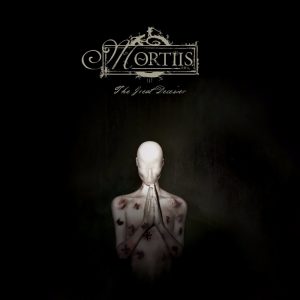 It’s the very first time that I hear this story.
It’s the very first time that I hear this story.
Mortiis: Yeah, it is a very frustrating story to tell. I’ve told it to a few people, but it’s so aggravating really, because I wasted a lot of time of my life listening to the wrong people. But you know, it’s a valuable lesson learned. I mean, these days, I barely listen to anyone, I just do my own stuff. I’m in complete control of my situation now and that’s the best feeling I’ve had in a long time. I’ve gotten rid of a lot of garbage.
This is really a bitter experience.
Mortiis: It kind of is, but you can choose either to constantly think about the bitter bullshit, which’ll just eat you alive, or to acknowledge: “OK, that’s a lesson, a very expensive lesson, but now, I’m a much wiser person.” So, I try to think like that.
14. On The Great Deceiver you talk about your thoughts, feelings, life experiences and points of view. Would you say that The Great Deceiver is an introspective, self-reflecting album?
Mortiis: Yeah, I would say so. All Mortiis records have been that, ever since The Smell of Rain. I don’t know, I don’t find a lot of inspiration writing about fucking partying out, I’m not fucking Motley Crue, I don’t want to sing about the fucking strippers and fucking snorting cocaine. So, I write about stuff that emotionally gets me to a certain level, usually something that fucking pisses me off. That’s always and forever been my inspiration, something that I find strangely inspirational. So, yes, absolutely, totally introspective.
15. I’ve read some opposing reviews of The Great Deceiver online. The album is really much to my liking. How pleased are you with it and with the feedback you got?
Mortiis: I’m really pleased with it because that album has been part of my life for so long. But I knew early on that it was going to be a really good album, I knew that it was gonna be the best album that we’ve done because I thought the song-writing was better, my vocal delivery was much better and that’s of course something I’m very self-conscious about, because that’s the voice that comes out of my mouth and I want that to sound good. I never felt like a great singer, but on The Great Deceiver I felt like that I could listen to my voice and think: “OK, this is actually quite good.” I know I’m not the singer in Muse and I’m not fucking technically great singer but at least the way I sound on that record really works with the music on that record. That’s all I’m asking for. And there’s all the time that we spent, the money, the frustration and the blood, sweat and tears, which sounds really cliché, but it is true. I mean, the band basically died on that record. I fired two people during the making of that record, I lost management, everybody fucking just died during the making of this album, so it’s like I could not afford for that album not to be great. And right now, I can think of only one bad review so far. All the other reviews have been really good. And that’s a relief because when you live with a record for that long before you put it out for other people to hear, it almost becomes like a baby, you don’t want to give it away because you don’t know what people are going to think about it. You’ve had it for so long in your own life, with no-one else who heard it, that there’s almost a sense of safety and unwillingness to let people ever hear it because then at least you’d never run the risk of everybody thinking it’s a piece of shit. But it was weird to finally see it released in the end. It was almost like an anti-climax because this album had represented so much drama for me, I almost felt as if when this record comes out the world is going to explode or something because I felt so passionate and emotional about it. But, of course, the world didn’t explode, nothing really happened, so it was like: “Oh, it’s out now. Shit, it’s over, it’s done. This album is no longer this sort of monster on my back, it’s actually out there and sort of living its own life.” That was a weird feeling. Like I said, it kind of felt like the world was going to fucking… I don’t know, that something really explosive is gonna happen, not because it’s a great record and it’s gonna sell in millions, but because emotionally it’s out there and it felt like bubble was gonna burst. I don’t know, it was just a weird emotional thing. It’s good to have it out there. I can finally move on and think about other things.
 16. You have just toured UK together with PIG. How was it for you?
16. You have just toured UK together with PIG. How was it for you?
Mortiis: The London show was great, I was really happy at it, I had a good time during that show. But I think that, quite frankly, the promotion for this tour was done too late. You have to do proper advertising a long time before the tour starts. All the bands were doing the best that we could to promote the tour online, but as you know, since we’ve just talked about Facebook, who the fuck sees the posts these days, nobody gets to see them.
Sorry to interrupt, but this is really interesting. I announced your tour on 16 January. I got your email because I was on your mailing list. But if I hadn’t been, maybe I wouldn’t have even found out about the tour.
Mortiis: So, you’re one of those who got the news about 6 to 7 weeks before the tour. Normally these tours are announced 6 months in advance. But, that’s a good example. If you hadn’t been on the list or you hadn’t checked your email… We committed to the tour in, I think, November, maybe early December, but the promo should have started immediately… because it takes a lot of time to reach everybody, as one can see from your own example, maybe you’ll reach some people in January, maybe even a few in February, but after that it’s just too late.
Let’s change the subject and speak of something more positive, the band was fucking… I thought that the band was really good on all the shows, with the performance and everything, I’ve been really happy with them. However, it was definitely one of the worst attended tours that I had done in UK, for sure, I didn’t exactly count, but at each place there might have been between 50 and 100 people. I think Glasgow was more, London was more than that, London was whatever how many they can take at Slimelight and it was pretty full. It wasn’t great. But it’s been a long time since I’ve let whether there were many people who came to the show affect me. Many years ago that could piss me off, because it would leave a little bit of a bruise on your ego, you know: “Oh, nobody came to see the show today, like, I’m in the bad mood now.” I don’t think like that any more. Life’s too short to fucking get pissed off about not pulling a lot of people. If the show was great, if the band was really great and the light show was great and everything sounded cool, I’ll just choose to fucking see that as a victory, as opposed to: “OK, there was 40 people in the crowd.” That’s not great but the show was awesome and everybody who came was fucking really happy.
 Yes, I got the impression that the crowd in Slimelight was really enthusiastic and happy to see you, both you and PIG. And I think that counts. I felt it from behind, because I was at the front shooting, but I was feeling it and every time I turned around, I saw that the people were really there for you.
Yes, I got the impression that the crowd in Slimelight was really enthusiastic and happy to see you, both you and PIG. And I think that counts. I felt it from behind, because I was at the front shooting, but I was feeling it and every time I turned around, I saw that the people were really there for you.
Mortiis: That’s a huge, important factor that all the bands have to learn. The idea is to give and take energy-wise. If the crowd is really responsive, it will feed so much energy to the band on stage and make the band so much better that the band will feed that energy right back, so we have this really cool energy loop. It sounds almost like a new age thing, but it’s true. Even if you play the show for 20 people, it happens to everyone, unless you become really successful and big. But try to think about 20, 30, 40 people, they came there for you, they’re fans. I don’t think there’s anything to be embarrassed about if you don’t get a lot of people to your show. It doesn’t mean that you suck or that people hate you. There can be a lot of factors. Everything from bad promotion to the fact that maybe your style of music isn’t really popular right now. That doesn’t mean that your band is bad. It just means that something else is catching people’s attention right now. Everything goes in waves. Next year it might pull 400 people in the same place, you can never know. So, just focus on doing the best show that you can, be proud of your performance, and fucking try to have a good time, you know. What else you’re gonna do there?
17. You have the new The Great Corrupter remix album coming on 21 April. The list of the remixers is quite impressive, there are Rhys Fulber, John Fryer, Apoptygma Berzerk, Die Krupps, PIG, Leaether Strip, to name a few. How did these collaborations come about?
Mortiis: I’ve been around for a few years now, so, of course, I’ve met people and I’ve been in touch with people online and in other ways for various reasons. I also had a list of people that I wanted to check out and to see if they would like to remix Mortiis. There were many different ways in which it happened. I mean, there were guys like Chris Vrenna, I’ve known him for years, and I’ve also known Rhys Fulber for a long time. I didn’t know Die Krupps personally, but I had friends who knew them and that’s how I got in touch with them. I live in the same street like Stephan Groth, so Apoptygma Berzerk was not a big deal, I just asked him; the same thing happened with Technomancer/Angst Pop, they live 15 minutes from my place, just like a couple of more or less local guys that I had thought would be cool to have on that album.
How did you get in touch with John Fryer?
Mortiis: Well, he lived in Oslo for a long time, as I’m sure you know. I know that he and Rhys are sharing the studio in LA. Rhys told me about it maybe a couple of months ago and I was like: “Fuck, the world has gotten really small, you’re both on my record.” And I don’t think that Rhys knew that John was on the record and I never told John that Rhys was on the record. John Fryer was particularly known in the 80s and the 90s… if you bought anything from the biggest labels, his name would be on everything, he’s been involved with a lot of stuff. I think that I got in touch with him was through a mutual friend, I forgot who it was but somebody in the States. I think that John was visiting him when he was over in the States maybe a couple of years ago who suggested to John that he should talk to me. I met John Fryer a while ago at the train station in Oslo. We had a small meeting over a coffee and we kinda stayed in touch. I first told him: “Hey man, I am working on this…” and then, in the fall of 2016 when I was putting together The Great Corrupter, I asked him: “Do you want to do a song, do you want to remix a song?” and he was on board with it and it was very easy, nothing complicated or technical. He’s just a human being, like everybody else on the record. All you have to do to get these guys is just ask them. The worst that can happen is that they can’t do it or that they  don’t have the time. That’s how I did it with all of them, either I knew them or somebody I knew knew them or, if I didn’t know them, I just contacted them, it’s easy as that. It will probably be a little while for another album like this, but it’s something that I really like. It’s just like the ultimate opportunity to get involved with bunch of other artists at the same time and have them fuck around with your stuff and see what they’ve envisioned for your music. And if you want 10 remixers for your album, you have to call 20 artists because half of them are gonna fall off. Half of them are not gonna do it: they cannot meet the deadlines, they are not gonna respond to your communication, or something. There have to be a few things that have to work. Number 1, they, of course, have to like the music that they’ll remix, otherwise I’m sure they wouldn’t want to do it and, number 2, they have to have the time in schedules and all that stuff. As long as you can get in touch with people early enough, it usually works out. But if you try to approach someone with: “OK, the deadline’s in two weeks, do you want to do the remix?”, the reply would be like: “Dude, no, there’s no time”, you know. I think there’re so many generic uninteresting remix records out there where you just got these guys who…I don’t mean any disrespect, but you just got these guys who just remix for the sake of remixing. I want to use guys and artists that I really respect, that I’ve liked for a long time, that I’m kind of fan of or at the very least that I am super certain that are going to do a good job. I don’t want to remix something just because I can do a remix. I’ve had probably met more than a handful of people, who I have no idea who they are, and they kinda go like: “Can I remix you?” Usually I tell them, I try to be nice about it, but my first thought is: “Well, this probably is gonna suck.” Which is a bit prejudiced, but my experience is that it will suck. My second thought is that I don’t have any use for their remix, even if I send them the tracks so that they can remix a song, what am I supposed to do with it, because I don’t always need a remix. When I have a project like The Great Corrupter, then, of course, I need remixes, but I really want people who I really respect and like. I cannot imagine any time in my life for where I would find a suitable use for a remix from somebody like those people, to be honest. And then, on top of it, it’s probably gonna be crappy, so why would I drag my name through that mud?
don’t have the time. That’s how I did it with all of them, either I knew them or somebody I knew knew them or, if I didn’t know them, I just contacted them, it’s easy as that. It will probably be a little while for another album like this, but it’s something that I really like. It’s just like the ultimate opportunity to get involved with bunch of other artists at the same time and have them fuck around with your stuff and see what they’ve envisioned for your music. And if you want 10 remixers for your album, you have to call 20 artists because half of them are gonna fall off. Half of them are not gonna do it: they cannot meet the deadlines, they are not gonna respond to your communication, or something. There have to be a few things that have to work. Number 1, they, of course, have to like the music that they’ll remix, otherwise I’m sure they wouldn’t want to do it and, number 2, they have to have the time in schedules and all that stuff. As long as you can get in touch with people early enough, it usually works out. But if you try to approach someone with: “OK, the deadline’s in two weeks, do you want to do the remix?”, the reply would be like: “Dude, no, there’s no time”, you know. I think there’re so many generic uninteresting remix records out there where you just got these guys who…I don’t mean any disrespect, but you just got these guys who just remix for the sake of remixing. I want to use guys and artists that I really respect, that I’ve liked for a long time, that I’m kind of fan of or at the very least that I am super certain that are going to do a good job. I don’t want to remix something just because I can do a remix. I’ve had probably met more than a handful of people, who I have no idea who they are, and they kinda go like: “Can I remix you?” Usually I tell them, I try to be nice about it, but my first thought is: “Well, this probably is gonna suck.” Which is a bit prejudiced, but my experience is that it will suck. My second thought is that I don’t have any use for their remix, even if I send them the tracks so that they can remix a song, what am I supposed to do with it, because I don’t always need a remix. When I have a project like The Great Corrupter, then, of course, I need remixes, but I really want people who I really respect and like. I cannot imagine any time in my life for where I would find a suitable use for a remix from somebody like those people, to be honest. And then, on top of it, it’s probably gonna be crappy, so why would I drag my name through that mud?
18. You have been a part of the music scene for a long time and you have inspired quite a few artists. How does it feel to be an inspiration to others? What would be your advice to new bands who are just starting now?
 Mortiis: Am I an inspiration? I had no idea. It’s always flattering though if someone says that. It’s just nice, you know. Let me see, some advice for someone who’s starting now. All I can say is that the one mistake that I made was that I was maybe a little bit too eager to sign to record labels. I mean, I signed one or two record deals probably a little bit too soon and I gave away too many rights. It took me a long time to feel like I was an independent free artist again, you know. Being signed to a record label isn’t necessarily as great as it sounds. Of course, to someone just starting out the idea of having a record label putting your record out must sound like a dream, but at the same time it can very well turn into a nightmare. The record labels’ll most likely take away all your rights, own that record, or maybe several of them, for the rest of eternity, because that’s how these record labels work. They’ll own it forever. And maybe you’ll never get paid, you never know, the deal can be really bad, so be very careful with the type of the deal that you sign, be very careful to read and understand the contracts and everything. And consider maybe doing it digitally. Because look at the percentages of sales these days, it’s maybe like 80% digital and the other 20% is physical. So, unless it’s very important to you to have this stuff out on CD or LP, consider putting it out through Tunecore or some other service like that and they will put your music on all these digital places like iTunes, Amazon, Spotify and all the smaller ones. They’ll do that for you and your record will be available at a lot of places and you can still own it. And then just work hard on promotion. I think that’s a good place to start. And be patient when it comes down to signing record deals, because that can be really dangerous. That’s my experience.
Mortiis: Am I an inspiration? I had no idea. It’s always flattering though if someone says that. It’s just nice, you know. Let me see, some advice for someone who’s starting now. All I can say is that the one mistake that I made was that I was maybe a little bit too eager to sign to record labels. I mean, I signed one or two record deals probably a little bit too soon and I gave away too many rights. It took me a long time to feel like I was an independent free artist again, you know. Being signed to a record label isn’t necessarily as great as it sounds. Of course, to someone just starting out the idea of having a record label putting your record out must sound like a dream, but at the same time it can very well turn into a nightmare. The record labels’ll most likely take away all your rights, own that record, or maybe several of them, for the rest of eternity, because that’s how these record labels work. They’ll own it forever. And maybe you’ll never get paid, you never know, the deal can be really bad, so be very careful with the type of the deal that you sign, be very careful to read and understand the contracts and everything. And consider maybe doing it digitally. Because look at the percentages of sales these days, it’s maybe like 80% digital and the other 20% is physical. So, unless it’s very important to you to have this stuff out on CD or LP, consider putting it out through Tunecore or some other service like that and they will put your music on all these digital places like iTunes, Amazon, Spotify and all the smaller ones. They’ll do that for you and your record will be available at a lot of places and you can still own it. And then just work hard on promotion. I think that’s a good place to start. And be patient when it comes down to signing record deals, because that can be really dangerous. That’s my experience.
Studio pics by Sebastian Ludvigsen
London show pics by Marija Buljeta
Tour poster illustration by All Things Rotten (Andrej Bartulovic)


